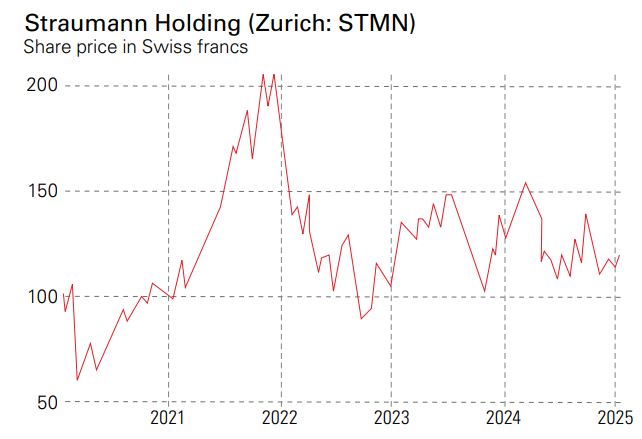Should you add Straumann Holding to your portfolio?
Straumann Holding is a global leader in the premium dental-care market.


Get the latest financial news, insights and expert analysis from our award-winning MoneyWeek team, to help you understand what really matters when it comes to your finances.
You are now subscribed
Your newsletter sign-up was successful
Want to add more newsletters?

Twice daily
MoneyWeek
Get the latest financial news, insights and expert analysis from our award-winning MoneyWeek team, to help you understand what really matters when it comes to your finances.

Four times a week
Look After My Bills
Sign up to our free money-saving newsletter, filled with the latest news and expert advice to help you find the best tips and deals for managing your bills. Start saving today!
The global dental market is expected roughly to double in size over the next decade. Rising demand for aesthetic treatments, such as implants, veneers and braces, is set to drive the bulk of the growth, particularly in major developed markets such as the US and across Europe. Demand for aesthetic treatments surged immediately after the pandemic as consumers, flush with cash, splashed out on improving their appearance. After several years of growth, demand flattened last year. But according to proprietary analysis by the team at investment bank Berenberg, that’s about to change, particularly in the largest market, the US.
Berenberg’s analysis found that 60% of dentists in the US expect spending on procedures to recover in 2025, driven by enhanced consumer sentiment following Donald Trump’s election. Tax cuts and lower interest rates could also help fuel demand, all of which could be good news for Straumann Holding (Zurich: STMN).
Straumann is a global leader in the tooth replacement and orthodontic procedures market. It develops, produces, and markets dental implants, dental prosthetics, oral orthodontics, and equipment and biomaterials for the dental industry worldwide. Over the past two decades, this market has grown rapidly thanks to the increasing wealth of the middle class and the prevalence of social media – a strong link has been identified between the time spent on social media and the desire for cosmetic procedures. These trends have been substantial tailwinds for the company. Over the past decade, the stock has produced a total return of around 17% per annum.
MoneyWeek
Subscribe to MoneyWeek today and get your first six magazine issues absolutely FREE

Sign up to Money Morning
Don't miss the latest investment and personal finances news, market analysis, plus money-saving tips with our free twice-daily newsletter
Don't miss the latest investment and personal finances news, market analysis, plus money-saving tips with our free twice-daily newsletter
Straumann's results boosted by a pandemic recovery
When the global economy reopened after the pandemic, Straumann became one of the key beneficiaries as consumers rushed to spend their lockdown savings. Sales surged into 2021, and so did the company’s stock, rising around 100% that year. However, demand slowed after the initial bounce, and revenue followed suit. Investors responded by dumping the stock. The shares lost around half of their value in the following year. And since the end of 2022, the stock has trended sideways as growth has remained elusive.
Berenberg’s analysis suggests that could change in 2025. It pencils in revenue growth of 10% in 2025, followed by about 11% in 2026. Combined with margin expansion, analysts believe this could lead to a 67% increase in earnings before interest and tax (Ebit). The company itself has laid out a target of CHF5 billion in revenue by 2030, up from around CHF2.5 billion estimated for 2024.
Straumann has multiple levers to pull to hit this target. Its analysis suggests the total addressable market (TAM) for key products could be in the region of CHF19 billion, with the most opportunity for growth in the market for clear aligners, the go-to product for teeth straightening. In a market that used to be dominated by old-fashioned braces, clear aligners look better and are more effective. Straumann estimates the TAM here could be worth as much as CHF6 billion per annum – growing at 15%-20% per annum – but its share of the market today is just 3%. In comparison, the company has a 32% share of the global market for dental implants, the fixtures used to support prosthetics.
The other key area of growth, which is a bit more of a wild card due to the level of competition, is in digital products. Products such as imaging and 3D printing have the potential to become a multi-billion market (compared with a few hundred million CHF at present), with a TAM of CHF24 billion, but scale, regulatory, and research and development costs are proving to be major headwinds.
Should you consider buying Straumann Holding?
Straumann’s growth over the next five years is expected to come from premium markets. It is focusing on expanding its presence in high-end orthodontics in key markets, primarily the US. Around 50% of the company’s implants are sold as premium products (and 60% of products across the group), so it already has an established foothold and reputation. Its good reputation allows the company to target premium margins. Its Ebit margin has averaged 26% over the past five years, and management has a margin target range of 25%-30%. New premium products are planned every two to three years and Straumann has historically introduced each new product at a 10%- 15% premium, according to Berenberg’s analysis.
The company has plenty of firepower to maintain its research edge and invest in growth. There’s net cash on the balance sheet and headroom for CHF1 billion-2 billion in leverage for deals, although management has signalled it won’t rush into deals just for the sake of growth. Research and development (benchmarked at around 5% of sales) and the expansion of manufacturing capacity (into the growing Brazilian and Chinese markets) are set to take precedence. Thomas Straumann, the grandson of the company’s founder, is the largest shareholder with a 15.7% stake. He has been a board member since 1990 and is watching over the company’s progress and operational decisions.
Concerns about the company’s growth have weighed on Straumann’s shares over the past six months, and this could present a good opportunity to buy. The stock is trading at an enterprise value to earnings before interest, tax, depreciation, and amortisation (EV/Ebitda) ratio of 22.7, based on Berenberg’s forward projections for 2024, falling to 17.5 on 2026 numbers, both substantially below the ten-year average of 28. Stripping out net cash, expected to hit around CHF500 million by 2026, and the multiple appears even more attractive.

This article was first published in MoneyWeek's magazine. Enjoy exclusive early access to news, opinion and analysis from our team of financial experts with a MoneyWeek subscription.
Get the latest financial news, insights and expert analysis from our award-winning MoneyWeek team, to help you understand what really matters when it comes to your finances.

Rupert is the former deputy digital editor of MoneyWeek. He's an active investor and has always been fascinated by the world of business and investing. His style has been heavily influenced by US investors Warren Buffett and Philip Carret. He is always looking for high-quality growth opportunities trading at a reasonable price, preferring cash generative businesses with strong balance sheets over blue-sky growth stocks.
Rupert has written for many UK and international publications including the Motley Fool, Gurufocus and ValueWalk, aimed at a range of readers; from the first timers to experienced high-net-worth individuals. Rupert has also founded and managed several businesses, including the New York-based hedge fund newsletter, Hidden Value Stocks. He has written over 20 ebooks and appeared as an expert commentator on the BBC World Service.
-
 Can mining stocks deliver golden gains?
Can mining stocks deliver golden gains?With gold and silver prices having outperformed the stock markets last year, mining stocks can be an effective, if volatile, means of gaining exposure
-
 8 ways the ‘sandwich generation’ can protect wealth
8 ways the ‘sandwich generation’ can protect wealthPeople squeezed between caring for ageing parents and adult children or younger grandchildren – known as the ‘sandwich generation’ – are at risk of neglecting their own financial planning. Here’s how to protect yourself and your loved ones’ wealth.
-
 Three key winners from the AI boom and beyond
Three key winners from the AI boom and beyondJames Harries of the Trojan Global Income Fund picks three promising stocks that transcend the hype of the AI boom
-
 RTX Corporation is a strong player in a growth market
RTX Corporation is a strong player in a growth marketRTX Corporation’s order backlog means investors can look forward to years of rising profits
-
 Profit from MSCI – the backbone of finance
Profit from MSCI – the backbone of financeAs an index provider, MSCI is a key part of the global financial system. Its shares look cheap
-
 'AI is the real deal – it will change our world in more ways than we can imagine'
'AI is the real deal – it will change our world in more ways than we can imagine'Interview Rob Arnott of Research Affiliates talks to Andrew Van Sickle about the AI bubble, the impact of tariffs on inflation and the outlook for gold and China
-
 Should investors join the rush for venture-capital trusts?
Should investors join the rush for venture-capital trusts?Opinion Investors hoping to buy into venture-capital trusts before the end of the tax year may need to move quickly, says David Prosser
-
 Food and drinks giants seek an image makeover – here's what they're doing
Food and drinks giants seek an image makeover – here's what they're doingThe global food and drink industry is having to change pace to retain its famous appeal for defensive investors. Who will be the winners?
-
 Barings Emerging Europe trust bounces back from Russia woes
Barings Emerging Europe trust bounces back from Russia woesBarings Emerging Europe trust has added the Middle East and Africa to its mandate, delivering a strong recovery, says Max King
-
 How a dovish Federal Reserve could affect you
How a dovish Federal Reserve could affect youTrump’s pick for the US Federal Reserve is not so much of a yes-man as his rival, but interest rates will still come down quickly, says Cris Sholto Heaton